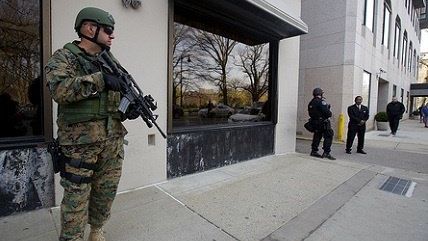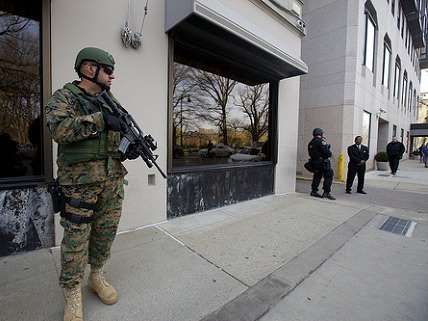Mass. Law Enforcement Corporations Not At All What Privatizing Police Would Be Like


The Washington Post's Radley Balko (formerly of Reason) highlights a disturbing detail from the police militarization report recently released by the American Civil Liberties Union (ACLU). What happened when the ACLU made public records requests to various Massachusetts law enforcement agencies, via the Post:
As it turns out, a number of SWAT teams in the Bay State are operated by what are called law enforcement councils, or LECs. These LECs are funded by several police agencies in a given geographic area and overseen by an executive board, which is usually made up of police chiefs from member police departments. In 2012, for example, the Tewksbury Police Department paid about $4,600 in annual membership dues to the North Eastern Massachusetts Law Enforcement Council, or NEMLEC. That LEC has about 50 member agencies. In addition to operating a regional SWAT team, the LECs also facilitate technology and information sharing and oversee other specialized units, such as crime scene investigators and computer crime specialists.
Some of these LECs have also apparently incorporated as 501(c)(3) organizations. And it's here that we run into problems. According to the ACLU, the LECs are claiming that the 501(c)(3) status means that they're private corporations, not government agencies. And therefore, they say they're immune from open records requests.
Corporatizing police forces looks a lot different than what privatizing police services would look like. In Massachusetts, government (law enforcement) agencies are adopting corporate status to dodge their obligations as "public servants." In privatizing a police force, local governments—or, gasp, even residents themselves—replace their police departments, burdened as they are by entrenched bureaucracies and systems of union-extracted entitlements with contracted services. In this way, local governments can dictate terms to how the local police force ought to operate that contemporary union contracts often prevent them from doing. A police service plagued by brutality and corruption could be replaced. In any case, those private agencies would be incentivized to provide the kind of services that will keep local government and voters happy so that their contracts can be extended—and not in protracted negotiations where government representatives have an interest in providing sweet heart deals to union bosses they rely on support.
Instead, we have police officers and their unions increasingly demanding that police departments be held above the democratic accountability expected of government. In Massachusetts they hide behind corporate status to keep how many wrong doors they bust down in commando-style raids a year. In Salt Lake City the police chief bitches that residents have the audacity to question why a cop shot a dog. In Seattle cops are suing to free themselves of federally-mandated reforms—a violation of their constitutional rights to things like reasonably searching and seizing you they argue while Albuquerque cops, now also subject to federal oversight for their history of misconduct and abuse, may be interested in doing the same.
